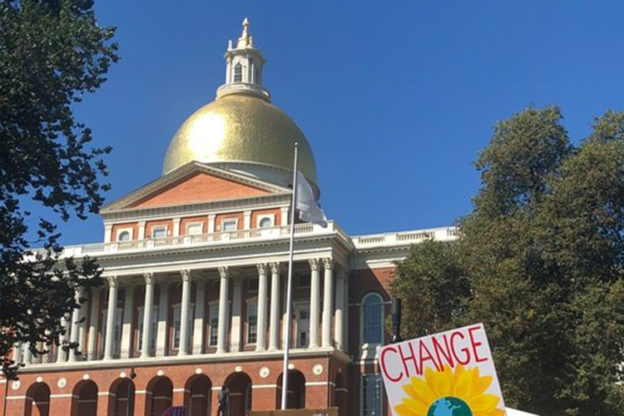Climate Champions is a Mass Audubon grassroots volunteer program to advocate for policies that advance nature-based climate solutions. With training from policy experts, Climate Champions advocate for local and state policies that help achieve the state’s goal to reach net-zero carbon emissions by 2050 and reverse negative health impacts of climate change for Environmental Justice communities.
Climate Champion Spotlight: Diane Juhas

“I decided to become a Climate Champion volunteer because my entire life I’ve been an environmentalist. I love hiking in the spring and fall, kayaking in the summer, and snow shoeing or cross-country skiing in the winter. My family became Mass Audubon members in 2013 and we have learned so much since joining. As a Climate Champion I am connecting with my community to learn how we can advance Massachusetts’ Clean Energy and Climate Plan and what my hometown is already planning. I met with my state representative at the Beacon Hill Lobby Day to advocate for investments in nature and climate. I submitted my recommendations for the CECP to explore and deploy ocean-based carbon removal solutions since MA has a 1,500-mile coastline. Most recently, with other Climate Champions, I have signed up to phone bank to Get out the Vote with the Environmental Voter Project.”
How It’s Going
This fall Climate Champions were invited to give input into the development of Mass Audubon’s legislative and policy priorities for the 2023-2024 legislative session. Mass Audubon uses several inputs and criteria to develop and prioritize bills, including:
- a topic’s connection to Mass Audubon’s Action Agenda
- an effort’s viability and potential impact
- our organizational capacity
- whether Mass Audubon’s support or opposition can make a difference in outcomes
These comprise what we call our “theory of change.” The Climate Champions program is an important element of our theory of change, as it is central to thinking about organizational capacity and impact. Our vision is for Climate Champions to represent a dramatic expansion of Mass Audubon’s ability to affect change.
Last month Climate Champions were briefed on the legislative process and the basics of a few priority issues, then asked to discuss them and offer suggestions. We are now reviewing all the fabulous feedback as we develop a Legislative Agenda for next year.
In addition to these roundtable discussions, champions have had the opportunity to:
- Submit comments on the state’s drafted outline for the MA Clean Energy and Climate Plan.
- Sign up with the Environmental Voter Project to make get out the vote phone calls
- Recruit Climate Champions in their own communities.
What’s Next
Mass Audubon’s Policy and Advocacy staff will be weighing the shifting landscape of climate advocacy after the election on November 8. We hope to celebrate the passage of the Community Preservation Act in the six towns where it’s on the ballot. We look forward to the Governor signing the long-stalled state economic development bill, which passed the Senate and House last week with investments in open space, recreation, ecological restoration, and climate adaptation.
Climate Champions will have an opportunity to discuss with Mass Audubon’s policy experts the impacts of the mid-term election on Massachusetts climate advocacy. In addition, champions will be participating in trainings and workshops on recruiting Climate Champions in their own communities.
Learn More
Everyone can be a Climate Champion, no matter your time constraints or experience level! Find out more and sign up >




